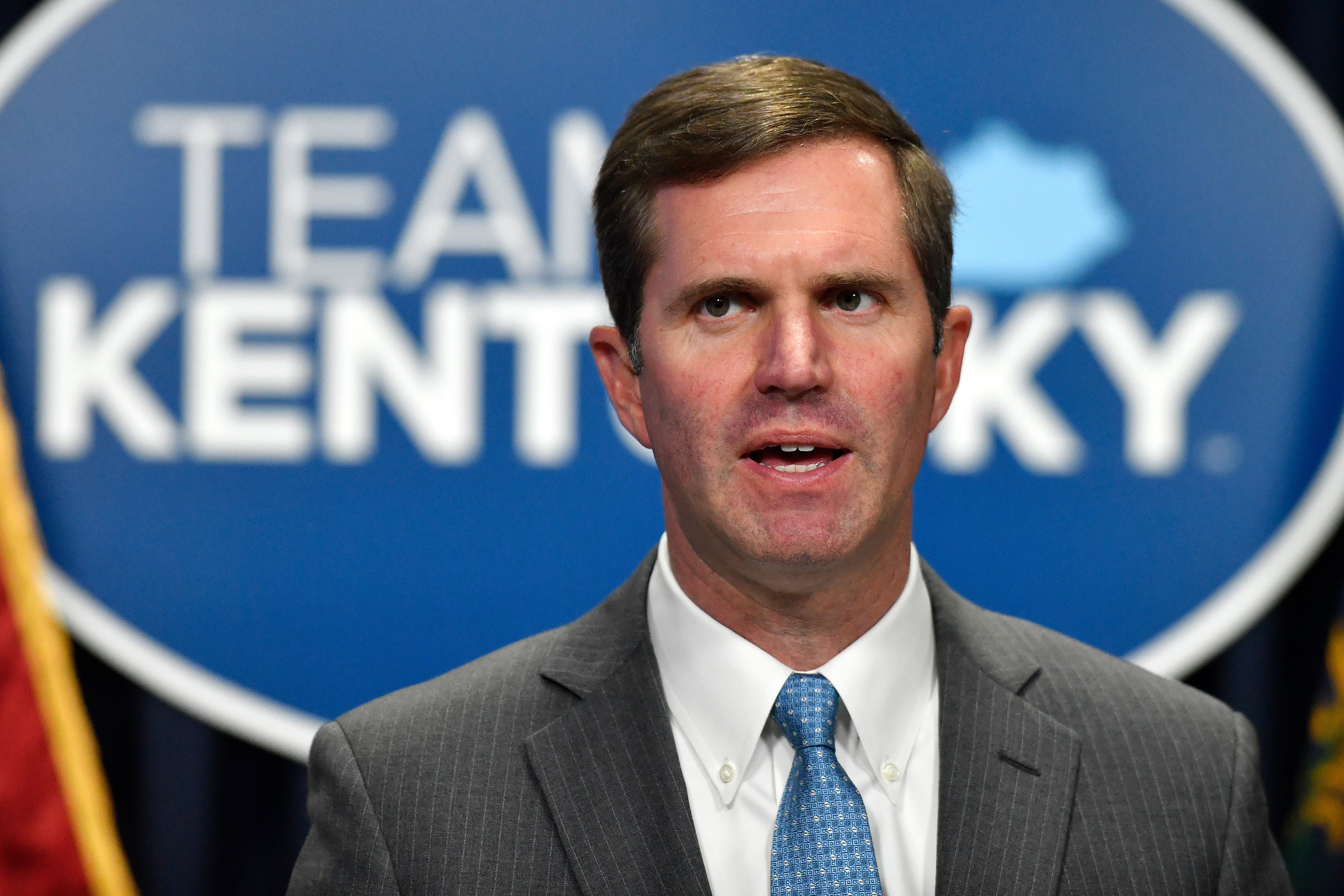Beshear defends legality of his action on medical marijuana
Kentucky Gov. Andy Beshear says he’s confident he’s on solid legal ground in allowing Kentuckians suffering from severe conditions to legally possess medical marijuana

Your support helps us to tell the story
From reproductive rights to climate change to Big Tech, The Independent is on the ground when the story is developing. Whether it's investigating the financials of Elon Musk's pro-Trump PAC or producing our latest documentary, 'The A Word', which shines a light on the American women fighting for reproductive rights, we know how important it is to parse out the facts from the messaging.
At such a critical moment in US history, we need reporters on the ground. Your donation allows us to keep sending journalists to speak to both sides of the story.
The Independent is trusted by Americans across the entire political spectrum. And unlike many other quality news outlets, we choose not to lock Americans out of our reporting and analysis with paywalls. We believe quality journalism should be available to everyone, paid for by those who can afford it.
Your support makes all the difference.Gov. Andy Beshear expressed confidence Thursday that he's on solid legal ground in allowing Kentuckians with debilitating conditions to legally possess medical marijuana, calling it a viable alternative to addictive medications in a state ravaged by the opioid crisis.
The Democratic governor's comments followed a backlash from prominent Republicans criticizing the executive order he signed Tuesday. Beshear's action will enable Kentuckians to possess up to 8 ounces of medical marijuana at any one time for use for specified medical conditions, provided the cannabis is purchased legally in other states. They’ll need to keep their receipt for proof.
A Kentuckian would need certification from a licensed health care provider to verify a diagnosis for at least one of 21 conditions that qualify. Those include cancer, epilepsy, multiple sclerosis, Parkinson’s disease and post-traumatic stress disorder. The order is set to take effect Jan. 1, 2023.
The governor said Thursday he would be “happy” to rescind his order if the state's GOP-dominated legislature passes legislation next year to legalize medical cannabis.
“But until they act, it’s my job to stand up and be there for folks” suffering from chronic or terminal illnesses and who could benefit from medical cannabis, Beshear said at his weekly news conference.
The governor touted medical cannabis as an alternative to addictive opioid medications. Until the legislature takes action, he said, his order allowing its use under strict conditions could save Kentuckians from drug overdoses or potential suicide attempts caused by chronic conditions.
“Think about what opioids have done to us — just devastated our state,” Beshear said Thursday.
Fatal drug overdoses rose nearly 15% in Kentucky last year, according to a report released in June. It showed that 2,250 Kentuckians died from drug overdoses in 2021 as the increased use of fentanyl — a powerful synthetic opioid — resulted in a record death toll in the state.
Some leading Republicans, including Attorney General Daniel Cameron, claimed the governor's unilateral action had overstepped his authority. Cameron said Tuesday that lawmakers "must be allowed to have their say” on the issue. He said his office was reviewing the governor's action to determine its "next steps.”
Cameron is among several GOP candidates vying to challenge Beshear in next year’s gubernatorial election, when the Democratic incumbent will seek a second term.
Republican state Rep. Jason Nemes, a leading supporter of legalizing medical marijuana, said in a social media post following Beshear's action: “As much as I support his effort to bring medical marijuana to Kentucky, this unprecedented power grab cannot stand.”
Beshear has expressed frustration with the legislature’s inability to legalize medical cannabis and insists the overwhelming majority of Kentuckians want to see it made legal.
He insisted Thursday that he acted within his authority based on the constitutional pardon powers granted to Kentucky governors. Beshear, a former attorney general, said there would be “no grounds” for any lawsuit challenging his executive action.
“I think you’re seeing a lot of reactions from people who’ve gotten caught up on the General Assembly vs. the executive branch, or them vs. me," Beshear said.
“This is not about us,” he added. "It’s about ... a veteran suffering from PTSD that’s had suicidal thoughts. It’s about somebody suffering from chronic pain. And if they’d just step back and think about the people that we’re trying to help, I think you’d hear a different tone.”
Jared Bonvell, a military veteran from northern Kentucky, said his health was deteriorating when a friend suggested he try marijuana for his medical conditions. He was using 13 medications at the time. Bonvell said he was skeptical, but “when I first started it, I started dropping medication after medication after medication." He said he got healthy and realized that he had a future.
“But then I was faced with, now you’re a criminal,” he said while attending Beshear's announcement on Tuesday. “It didn’t make sense.”
An advisory committee formed by the governor spent months gathering public input before Beshear took the action. He first floated the possibility of executive action on the issue in the spring, after a medical cannabis legalization bill again died in the legislature. The measure passed the House but stalled in the Senate.